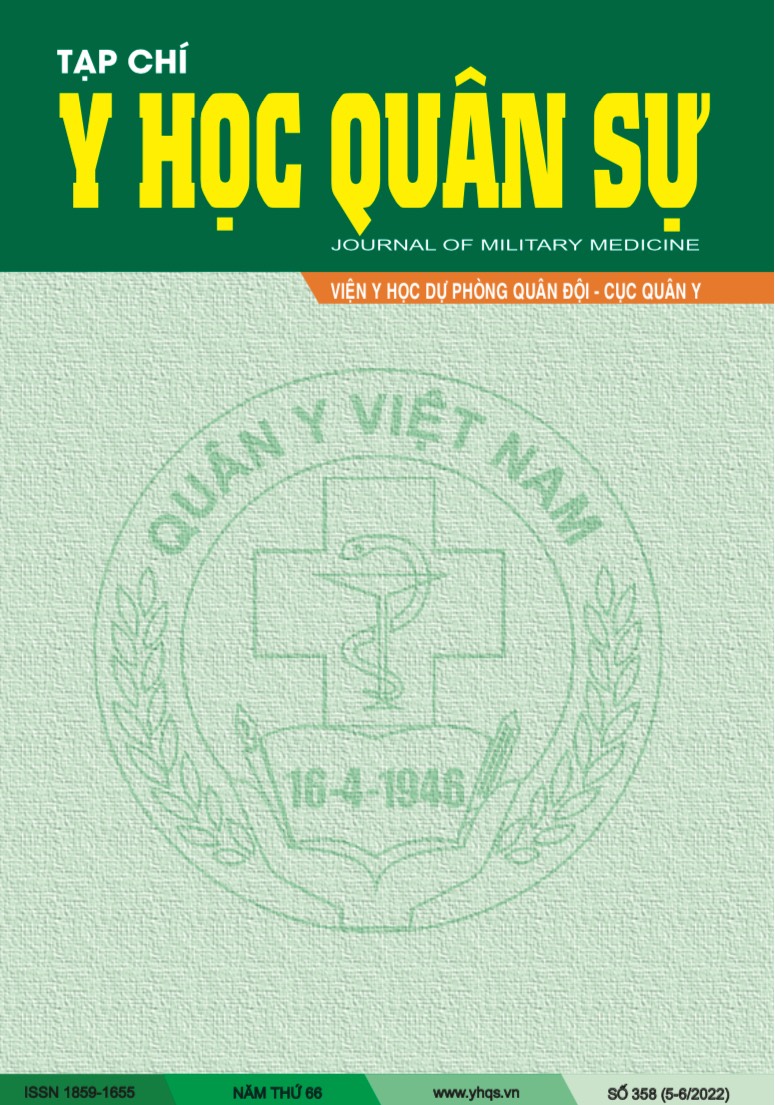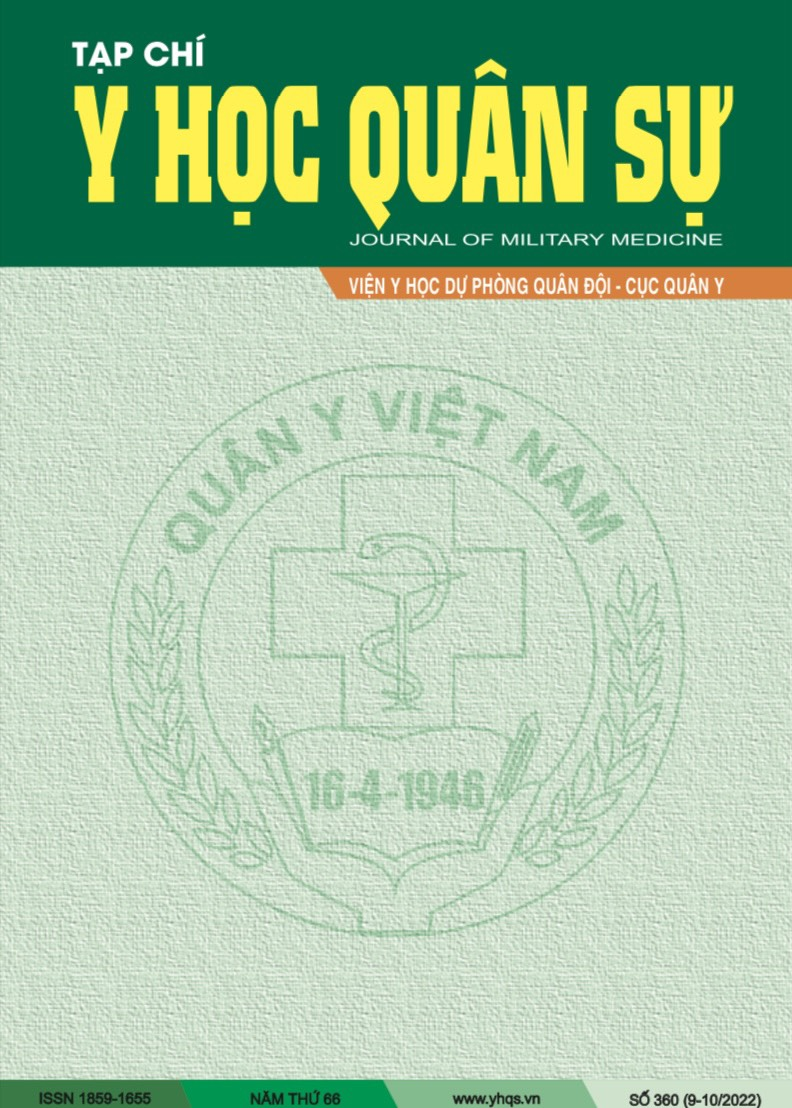KẾT QUẢ ĐIỀU TRỊ 86 BỆNH NHÂN RỐI LOẠN SINH TỦY TẠI VIỆN HUYẾT HỌC - TRUYỀN MÁU TRUNG ƯƠNG, TỪ NĂM 2017-2021
Từ khóa:
rối loạn sinh tủy, decitabineTóm tắt
Nghiên cứu thuần tập 86 bệnh nhân chẩn đoán xác định rối loạn sinh tủy theo tiêu chuẩn WHO-2016, phân nhóm nguy cơ theo tiêu chuẩn IPSS-R, điều trị bằng phác đồ chăm sóc hỗ trợ và phác đồ decitabine đơn trị tại Viện Huyết học - Truyền máu Trung ương, từ tháng 01/2018-6/2021.
Kết quả: Bệnh nhân trung bình 63,65 tuổi, tỉ lệ nam giới (48,8%) tương đương nữ giới (51,2%). Tỉ lệ bệnh nhân nhóm MDS-EB-1 chiếm 31,4%, nhóm MDS-EB-2 chiếm 29,1%, nhóm MDS-SLD chiếm 16,3% và nhóm MDS-MLD chiếm 14,0%. Phân nhóm nguy cơ theo IPSS-R: rất thấp (10,5%), thấp (30,2%), trung bình (24,4%), cao (22,1%) và rất cao (12,8%). Về điều trị, 43,0% bệnh nhân theo phác đồ chăm sóc hỗ trợ và 57,0% bệnh nhân theo phác đồ decitabine đơn trị. Có 66,3% bệnh nhân đáp ứng điều trị tổng thể (trong đó, 34,9% đáp ứng hoàn toàn, 31,4% đáp ứng một phần). Tỉ lệ đáp ứng tổng thể trên nhóm điều trị chăm sóc hỗ trợ (81,1%) cao hơn so với nhóm điều trị decitabine (55,1%), khác biệt có ý nghĩa thống kê với p = 0,012. Thời gian sống toàn bộ trung bình là 26,49 ± 1,55 tháng và thời gian sống thêm không tiến triển (PFS) là 25,32 ± 1,64 tháng. Các tác dụng không mong muốn ở máu ngoại vi gồm: giảm hồng cầu, giảm bạch cầu trung tính và giảm tiểu cầu (với tỉ lệ lần lượt là 41,9%, 27,9% và 18,6%); ngoài ra, có 11 tác dụng không mong muốn khác, như chán ăn, đau đầu, táo bón, nôn, ho, sốt, tiêu chảy, viêm phổi kẽ, tăng men gan, tăng đường máu, giảm albumin...
Tài liệu tham khảo
Greenberg P.L, Stone R.M, Al-Kali A, et al (2017), “Myelodysplastic Syndromes, Version 2, 2017, NCCN Clinical Practice Guidelines in Oncology”, J Natl Compr Cancer Netw JNCCN,15 (1): 60-87.
Montalban-Bravo G, Garcia-Manero G (2018), “Myelodysplastic syndromes: 2018 update on diagnosis, risk-stratification and management”, Am J Hematol, 93 (1): 129-147.
Cazzola M, Malcovati L, “Myelodysplastic syndromes-coping with ineffective hematopoiesis”, ttp://dx.doi.org/10.1056/NEJMp048266.
Kantarjian H, Issa J.P.J, Rosenfeld C.S, et al (2006), “Decitabine improves patient outcomes in myelodysplastic syndromes: results of a phase III randomized study”, Cancer, 106 (8): 1794-1803.
Comparison between 5-day decitabine and 7-day azacitidine for lower-risk myelodysplastic syndromes with poor prognostic features: a retrospective multicentre cohort study Scientific Reports, Accessed December 31, 2020.
Cheson B.D, Greenberg P.L, Bennett J.M, et al (2006), “Clinical application and proposal for modification of the International Working Group (IWG) response criteria in myelodysplasia”, Blood, 108 (2): 419-425.
Jung K.S, Kim Y.J, Kim Y.K, et al (2019), “Clinical Outcomes of Decitabine Treatment for Patients With Lower-Risk Myelodysplastic Syndrome on the Basis of the International Prognostic Scoring System”, Clin Lymphoma Myeloma Leuk, 19 (10): 656-664.
Rollison D.E, Howlader N, Smith M.T, et al (2008), “Epidemiology of myelodysplastic syndromes and chronic myeloproliferative disorders in the United States, 2001-2004, using data from the NAACCR and SEER programs”, Blood, 112 (1): 45-52.
What Are Myelodysplastic Syndromes?, American Cancer Society, Accessed August 11, 2020.
Hong M, He G (2017), “The 2016 Revision to the World Health Organization Classification of Myelodysplastic Syndromes”, J Transl Intern Med., 5(3):139-143.
Greenberg P, Cox C, LeBeau M.M, et al (1997), “International scoring system for evaluating prognosis in myelodysplastic syndromes”, Blood., 89 (6): 2079-2088.
Greenberg P.L, Tuechler H, Schanz J, et al (2012), “Revised International Prognostic Scoring System for Myelodysplastic Syndromes”, Blood, 120 (12): 2454-2465.
Montalban-Bravo G, Garcia-Manero G (2018), “Myelodysplastic syndromes: 2018 update on diagnosis, risk-stratification and management”, Am J Hematol, 93 (1): 129-147.
Steensma D.P (2018), “Myelodysplastic syndromes current treatment algorithm 2018”, Blood Cancer J., 8 (5): 47.
Greenberg P.L, Stone R.M, Al-Kali A, et al (2017), “Myelodysplastic Syndromes, Version 2.2017, NCCN Clinical Practice Guidelines in Oncology”, J Natl Compr Cancer Netw JNCCN, 15 (1): 60-87.
Jabbour E, Short N.J, Montalban-Bravo G, et al (2017), “Randomized phase 2 study of low- dose decitabine vs low-dose azacitidine in lower- risk MDS and MDS/MPN”, Blood, 130 (13): 1514- 1522.
Hảo N.Q, Anh T.T, Hương L.T.T, et al (2021), “Kết quả điều trị hội chứng rối loạn sinh tủy bằng decitabine tại Viện Huyết học - Truyền máu Trung ương”, Tạp chí Nghiên cứu học, 139 (3): 117-125.
Greenberg P.L, Tuechler H, Schanz J, et al (2012), “Revised international prognostic scoring system for myelodysplastic syndromes”, Blood, 120 (12): 2454-2465.
Kantarjian H, Issa J.P.J, Rosenfeld C.S, et al (2006), “Decitabine improves patient outcomes in myelodysplastic syndromes: Results of a phase III randomized study”, Cancer, 106 (8): 1794-1803.
Lee B.H, Kang K.W, Jeon M.J, et al (2020), “Comparison between 5-day decitabine and 7-day azacitidine for lower-risk myelodysplastic syndromes with poor prognostic features: a retrospective multicentre cohort study”, Sci Rep, 10 (1): 39.



